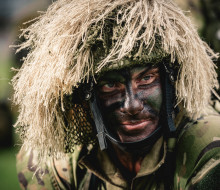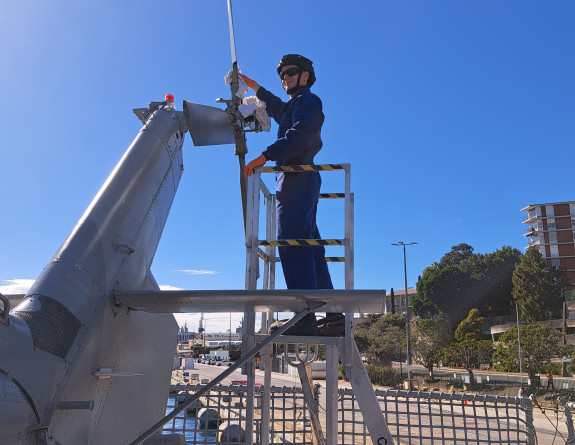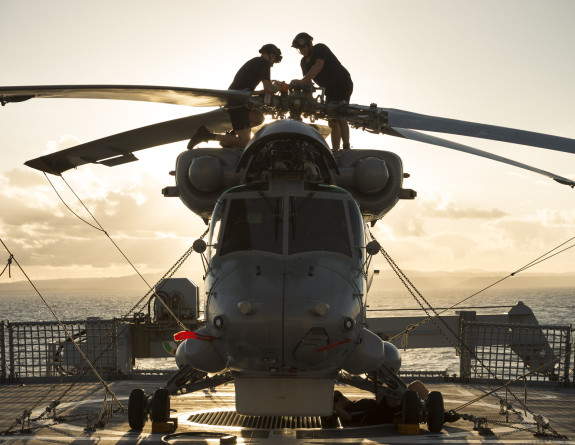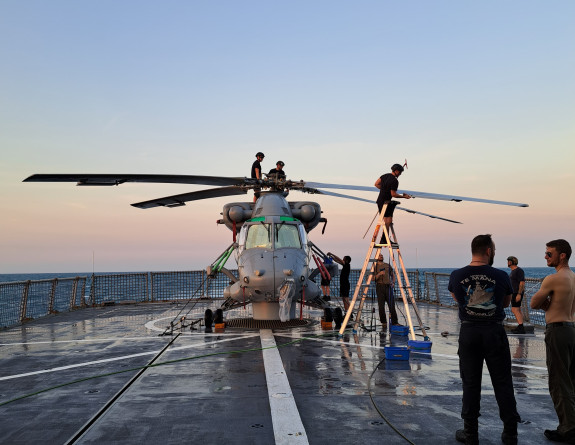
Top shooter right on the mark as he gets his Army career underway
28 January 2025
Unfortunately you are viewing this website on an outdated browser which does not support the necessary features for us to provide an adequate experience. Please switch to a modern browser such as latest version of Google Chrome, Mozilla Firefox, Apple Safari or Microsoft Edge.
Ngā mihi nui
What’s it like being an Air Force Technician on a Navy ship? Corporal Dean Crene shares his insights on keeping the Navy flying over five months at sea.
Like most other aircraft technicians in the Royal New Zealand Air Force, going to sea was not what we envisaged when we joined. But when the opportunity came up to embark in HMNZS Te Mana with technicians from No. 6 Squadron for a five-month deployment. I put my hand up.
Life on ship is what you make of it. On a normal day at sea we will have an idea of when the aircraft is planning to fly, but flying can start at any time.
To start the evolution there will be a broadcast over the ship’s speaker system called ‘Pipes’ with the command “prepare for flying”. That means our team of eight technicians and three aircrew have 60 minutes to get the aircraft in the air.
This involves moving the aircraft out of the hangar onto the flight deck, spreading the blades, refuelling and setting up all the required safety equipment in case of an emergency. Once the aircraft is started up we pull the pins, chocks and tie down chains, then kick the tyres and light the fires and the aircraft is on its way.
While the aircraft is flying we are on standby for anything that might be required. Anything happening on the flight deck is our responsibility, whether it is a rotors running refuel, weapon load, hooking up an underslung load or winching someone into the aircraft.
When the aircraft lands we fold the blades and drag it inside the hangar, carry out post-flight servicings and fix any faults before the next day’s flying.
Flight deck operations are additional to the normal duties of a technician in the Air Force and fairly unique to No. 6 Squadron so it was also a great opportunity for me to upskill and develop techniques for things like my resilience, leadership skills and my ability to work under pressure.



I have also been involved with some larger tasks such as removing blades or replacing gearboxes, which comes with its added challenges rocking and rolling on the open ocean. We do not have the luxuries of our hangar in Whenuapai and have limited equipment, meaning we have to use Kiwi ingenuity and think outside the box to get things done.
During the deployment we spent lots of time around Australia with a few stops in Sydney before heading north. Between some great times spent in ports exploring Vietnam, Malaysia and Singapore we participated in Exercise Bersama Lima, engaging with other nations to cement the training we had conducted over the previous months.
During the exercise there was a day of respite where personnel from each ship were dropped off on a Malaysian island. We held a beach sports tournament ending with cultural performances and a meal to suit. This was a great opportunity to socialise, learn about new cultures and see how we are from extremely different backgrounds, but have come together to learn from each other and develop new skills to protect our nations and the region.
Over a five-month deployment on a ship we got to know each other quite well, especially our small maintenance team. Working, socialising and then living together in a small space can be uncomfortable to begin with. If everyone is considerate and respectful there is nothing to worry about.
Over the deployment we learned how each individual operates, where their limits were and formed a close team that could rely on each other with an immense level of trust that I haven’t found in any other team yet.
Integrating with the Royal New Zealand Navy is essential, we are a very small representation of the Air Force, but it is key to building relationships between the services. Everyone is there for the same reasons, serve our country and go on an adventure. It is also a great feeling when you realise how much of a capability you are contributing to the ship, the Navy and the Defence Force as part of the larger organisation putting into practice years of training to work together achieving our objectives.
Working on a ship requires a flexible mind-set as the plan for the day always changes and even though there are long days, sometimes in harsh conditions, it always feels worth it in the end.